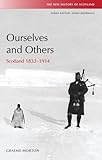Ourselves and Others : Scotland 1832-1914 / Graeme Morton.
Material type: TextSeries: New History of Scotland : NHSPublisher: Edinburgh : Edinburgh University Press, [2022]Copyright date: ©2012Description: 1 online resource (320 p.)Content type:
TextSeries: New History of Scotland : NHSPublisher: Edinburgh : Edinburgh University Press, [2022]Copyright date: ©2012Description: 1 online resource (320 p.)Content type: - 9780748620487
- 9780748629190
- 941.1081
- DA772
- online - DeGruyter
| Item type | Current library | Call number | URL | Status | Notes | Barcode | |
|---|---|---|---|---|---|---|---|
 eBook
eBook
|
Biblioteca "Angelicum" Pont. Univ. S.Tommaso d'Aquino Nuvola online | online - DeGruyter (Browse shelf(Opens below)) | Online access | Not for loan (Accesso limitato) | Accesso per gli utenti autorizzati / Access for authorized users | (dgr)9780748629190 |
Frontmatter -- Contents -- Tables and Figures -- Acknowledgements -- Introduction -- 1 Being Scotland -- 2 Weather Scotland Will -- 3 We Live, We Die -- 4 Urban Scots -- 5 Getting Around -- 6 Working Scots -- 7 Poverty, Spending and Sport -- 8 Reading, Writing, Talking and Singing -- 9 Believing Ourselves -- 10 Controlling Ourselves and Others -- 11 Emigration and Diaspora -- 12 Being Ourselves -- Further Reading -- Index
restricted access online access with authorization star
http://purl.org/coar/access_right/c_16ec
What does it mean to be a Scot and what forged that identity?Read and download the first chapter from Ourselves and Others: Scotland 1832–1914 for free now (pdf)This revised and updated volume of the New History of Scotland series explores a period of intense identity formation in Scotland. Examining the 'us and them' mentality, it delivers an account of the blended nature of Scottish society through the transformations of the industrial era from 1832 to 1914.Alongside the history of Scotland's national identity, and its linked political and social institutions, is an account of the changing nature of society within Scotland and the relentless eddy of historical developments from home and away. Where previous histories of this period have focused on industry, this book will take a closer look at the people that helped to form Scottish national identity. Graeme Morton shows that identity was a key element in explaining Industrial Scotland, charting the interplay between the micro and the macro and merging the histories of the Scots and the Scottish nation.Graeme Morton is the Scottish Studies Foundation Chair and Director of the Centre for Scottish Studies at the University of Guelph.Key FeaturesPopular and well-liked student seriesCompletely updated and revised with new researchCharts the birth of modern Scottish identity 1832-1914Emphasis on weather, sport, leisure, consumption and material culture of childhood"
Mode of access: Internet via World Wide Web.
In English.
Description based on online resource; title from PDF title page (publisher's Web site, viewed 29. Jun 2022)


